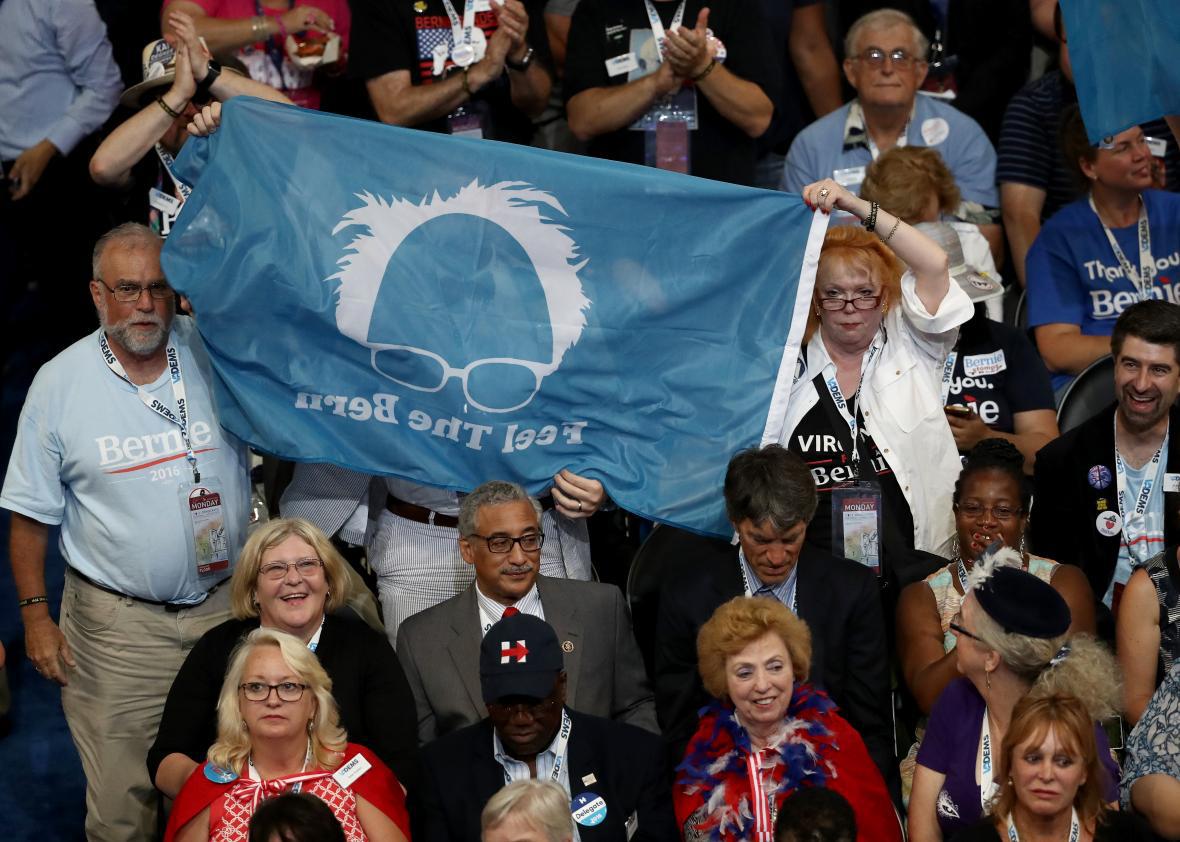PHILADELPHIA—Though the Democratic National Convention was gaveled in by Baltimore Mayor Stephanie Rawlings-Blake instead of by deposed chairwoman Debbie Wasserman Schultz, Sanders delegates were still restless at the start of the afternoon program. The usual chants of “BERN-IE, BERN-IE” could be heard about every 30 seconds—not for any particular reason, but typically when the names of either Hillary Clinton or Tim Kaine had been dropped.
At first it was mostly a nuisance, the shouting and the booing, and not really damaging to the work of the convention. Rep. Marcia Fudge, the permanent chairwoman of the convention, saw the need to lay a marker early as she was interrupted by chants and boos. “May I just make a point?” she said, interrupting her remarks. “I intend to be fair. I want to hear the varying opinions here. I am going to be respectful of you. And I want you to be respectful of me.”
This made little difference. As I walked by the Louisiana and Colorado delegations, a group of Sanders supporters wearing white baseball caps with a graphic of a bird next to Sanders’ name were going through one of their “BERN-IE” waves. An older black woman sitting in front of them looked away and rolled her eyes.
The discontent was concentrated in certain Sanders-friendly pockets. The Wisconsin-Indiana seating corridor is rowdy. Near the back, the Washington-Oregon axis is rowdy. But the rowdiest section might be in California, simply because of its 475 delegates. Though Clinton won the state, proportional allocation ensured Sanders would still collect 221 delegates. Many of them were sitting together—near the back of the section, like cool kids—and hollering about the Trans-Pacific Partnership.
The platform committee had punted on the Trans-Pacific Partnership, choosing to acknowledge that the party had differing views—and then not siding with either of them, despite its two presidential candidates theoretically opposing the agreement. (Word is the Obama administration pushed to nix a provision trashing the trade deal his administration spent years negotiating.) Many delegates, mostly for Sanders, came to the Wells Fargo Center on Monday with signs depicting TPP crossed out. If all of this first-day angst from Sanders delegates was to be channeled into something meaningful, it would be a rejection of the platform.
But the convention managers handled the job well. Rather than just rushing out to pass the report without saying much about it—the mistake the RNC made as it moved to pass its rules package last week—the DNC trotted out several speakers ahead of the process to talk about the Sanders campaign’s gains.
Maine state Rep. Diane Russell spoke of her successful efforts on the rules committee to limit the number of superdelegates in conventions going forward. When Sanders’ California supporters began chanting “NOT FOR SALE,” she acknowledged them and repeated their words.
“I want to be clear,” Russell said. “We did not win by ‘selling out.’ We won this by standing. We did this by standing together.”
Ben Jealous, the former NAACP president and one of Sanders’ top surrogates during his campaign, also spoke and ran through various planks in “the most progressive platform in history.” There were scattered boos from Sanders delegates when he urged them to support Clinton. But it was nothing like earlier in the day, when Sanders himself urged the same.
This cushioning of the TPP-neutral platform’s passage worked. When Fudge called the report up for a voice vote, the ayes were loud at first, and then kept their noise levels up—perhaps anticipating a wave of nays they hoped to drown out. Fudge wisely gave the ayes time to quiet down so that the nays could be registered, and once she finally called them, it was clear the ayes had it.
Sanders delegates, perhaps satisfied by the blandishments, or perhaps simply tired out, have been much quieter ever since.
